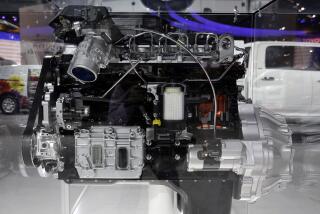Auto Dealers Agree to Settle U.S. Complaint on Price-Fixing : Consumers: Action ends federal probe of alleged antitrust violations. Trade group admits no wrongdoing.
- Share via
WASHINGTON — An association representing most of the nation’s auto dealers agreed Wednesday to settle a Justice Department complaint that it urged its members to engage in price-fixing and other anti-competitive schemes.
The agreement settled a lawsuit accusing the National Automobile Dealers Assn. of promoting pricing programs that, in some cases, could have cost consumers as much as $1,000 per car, Justice Department officials said.
“NADA stepped well over the line by trying to keep various players in the auto industry from taking steps that would reduce car prices for consumers,” said Assistant Atty. Gen. Anne K. Bingaman, head of the antitrust division. “Trade associations must not be allowed to become a cover for cartel-like activity.”
The association did not admit wrongdoing in the settlement, but agreed for the next 10 years not to engage in practices or programs that could lead to price-fixing or other anti-competitive behavior.
“We’ve argued all along that we didn’t break any laws and we still admit no wrongdoing,” NADA spokesman Ted Orme said.
“We believe that we could’ve made those same arguments in court, but that would have meant taking on the government,” Orme said. NADA’s board decided that was a no-win situation.
The agreement, which must be approved by a federal court, ends a one-year Justice Department investigation into charges that NADA, in an attempt to help its 23,000 members boost profits, urged dealers to boycott or reduce their vehicle purchases from auto manufacturers who offered rebates to consumers.
Dealers have long argued that their profits on new car sales suffer because they frequently must pay part of the rebates.
Bingaman said her investigators “were not able to quantify the exact amount of money” that might have been lost to consumers as a result of NADA’s actions. But some of the rebates that the association allegedly sought to eliminate could have saved consumers $1,000 per car, she said.
NADA used its full lobbying and financial muscle as a trade association “to exhort its dealers to engage in various concerted activities” that, if most of the dealers had complied, would have “posed a real threat to the economy and to consumers,” Bingaman said.
The consent decree “stops this association in its tracks” and sends a message to other trade associations that the government will not tolerate practices that it views as anti-consumer, she said.
Bingaman said the investigation was prompted by complaints “from some dealers and others” who refused to go along with NADA’s recommendations. In some cases, she said, NADA threatened to expel dissident dealers from the association.
NADA officials said Wednesday that the charges are a product of the government’s misunderstanding of how the auto industry operates. What the association was attempting to do, Orme said, was help dealers cope with declining profit margins on the sales of new cars and trucks.






